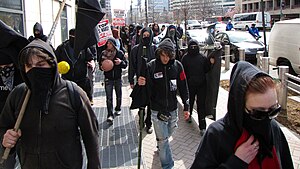
Back بلاك بلوك Arabic Чорны блёк BE-X-OLD Bloc negre Catalan Black Bloc Czech Sort blok Danish Schwarzer Block German Μαύρο Μπλοκ Greek Nigra bloko Esperanto Bloque negro Spanish Bloke beltz Basque

| Part of a series on |
| Anarchism |
|---|
 |
| Part of a series on |
| Anarchist communism |
|---|
 |
A black bloc (sometimes black block) is a tactic used by protesters who wear black clothing, ski masks, scarves, sunglasses, motorcycle helmets with padding or other face-concealing and face-protecting items.[1][2] The clothing is used to conceal wearers' identities from both the police and politically different organizations by making it difficult to distinguish between participants. It is also used to protect their faces and eyes from pepper spray, which is used by police during protests or civil unrest. The tactic also allows the group to appear as one large unified mass.[3] Black bloc participants are often associated with anarchism, anarcho-communism, communism, libertarian socialism and the anti-globalization movement. A variant of this type of protest is the Padded bloc, where following the Tute Bianche movement protesters wear padded clothing to protect against the police.
The tactic was developed in the 1980s in the European autonomist movement's protests against squatter evictions, nuclear power, and restrictions on abortion, as well as other influences.[1] Black blocs gained broader media attention outside Europe during the 1999 Seattle WTO protests, when a black bloc damaged property of Gap, Starbucks, Old Navy, and other multinational retail locations in downtown Seattle.[1][4]
- ^ a b c Autonomia and the Origin of the Black Bloc. Retrieved 7 November 2008.
- ^ Carlson, Kathryn Blaze (14 June 2010). "The Black Bloc: A look at the anarchists who could be the biggest G20 security threat". National Post.
- ^ "Fashion Tips for the Brave". CrimethInc. Archived from the original on 21 January 2017. Retrieved 26 August 2013.
- ^ Lennard, Natasha (22 January 2017). "Neo-Nazi Richard Spencer Punched--You Can Thank the Black Bloc". National Post.